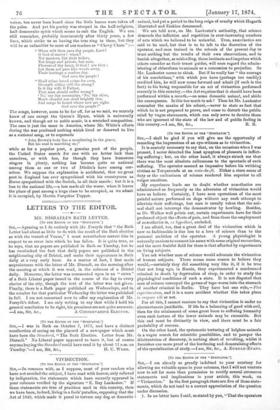VIVISECTION.
[To TIER EDITOR OF THE "SPECTATOR."] SIR, —In common with, as I suppose, most of your readers who have not avoided the subject, I have read with horror, only relieved by indignation, the statements which have recently appeared in your columns verified by the signature "E. Ray Lankester." If these statements are true of practices used in this country, then we have been, indeed, living in a fools' paradise, supposing that the Act of 1849, which made it penal to torture any dog or domestic
animal, had put a period to the long reign of cruelty which Hogarth illustrated and Erskine denounced.
We are told now, on Mr. Lankester's authority, that science demands the infliction and repetition in ever-increasing numbers of acts which we believed to be unlawful. True, antesthetics are said to be used, but that is to be left to the discretion of the operator, and men trained in the schools of the present day to trust nothing but the results of their own observations, and to banish altogether, as misleading, those instincts and impulses which others consider as their truest guides, will soon regard the admin- istering of chloroform to animals as a concession to prejudice. So Mr. Lankester seems to think. But if he really has "the courage of his convictions," with which you have (perhaps too readily) credited him, he will now come forward and admit (if such is the fact) to his being responsible for an act of vivisection performed recently in this country,—the Act requires that it should have been performed within a month,—on some domestic animal, and abide the consequence. Is this too much to ask? Then let Mr. Lankester remember the maxim of his school,—never to state as fact that which he is not prepared to prove, and cease to disturb the public mind by vague statements, which can only serve to deceive those who are ignorant of the state of the law and of public feeling in


































 Previous page
Previous page